|
|
|
Sort Order |
|
|
|
Items / Page
|
|
|
|
|
|
|
| Srl | Item |
| 1 |
ID:
131958
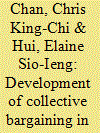

|
|
|
|
|
| Publication |
2014.
|
| Summary/Abstract |
2010 was a turbulent year for labour relations in China. The wave of strikes sparked by the Honda workers has highlighted the urgent need for trade union reform and workplace collective bargaining. In response to this turbulence, the Chinese government has stepped up efforts to promote the practice of collective bargaining, which had been neglected under the existing "individual rights-based" labour regulatory framework. In the midst of rapid social and policy changes, this article aims to examine the effect of labour strikes on the development of collective bargaining in China. The authors argue that, driven by growing labour protests, the collective negotiation process in China is undergoing a transition, from "collective consultation as a formality," through a stage of "collective bargaining by riot," and towards "party state-led collective bargaining." This transition, however, is unlikely to reach the stage of "worker-led collective bargaining" in the near future.
|
|
|
|
|
|
|
|
|
|
|
|
|
|
|
|
| 2 |
ID:
175569
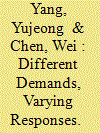

|
|
|
|
|
| Summary/Abstract |
While Chinese local governments remain extremely wary of workers’ collective actions, they do not always suppress them; sometimes, they tolerate such actions and even seek to placate workers. What accounts for these different government responses to workers’ collective actions? Based on a sample of over 1,491 collective action cases that took place in Guangdong between 2011 and 2016, we find that the types of demands raised by workers during collective actions affect how local governments respond. Local governments are likely to forcefully intervene in collective actions in which workers make defensive claims concerning issues of payment. In contrast, local governments are likely to use non-forceful approaches in response to actions in which workers make defensive claims regarding social security.
|
|
|
|
|
|
|
|
|
|
|
|
|
|
|
|
| 3 |
ID:
088880
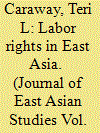

|
|
|
|
|
| Publication |
2009.
|
| Summary/Abstract |
This article examines the impact of recent economic and political change on collective and individual labor rights in East Asia. Deploying a new index for measuring de jure and de facto labor rights, the article presents new comparative data on labor rights in the region. Democratization has produced stronger collective labor rights in much of the region, but labor laws in most countries still fall far short of international labor standards. East Asia's labor laws offer similar levels of protection for individual labor rights to the rest of the world when firing costs are taken into account, and low regional averages are primarily an effect of Singapore's extremely weak individual labor rights. Few countries have revised their labor laws in the direction of greater labor market flexibility. However, the distance between law and practice is wide, so improvements in laws are not necessarily reflected on the ground. Flexibility enters through the back door of ineffective labor law enforcement, which in turn has affected the organizing efforts of unions.
|
|
|
|
|
|
|
|
|
|
|
|
|
|
|
|
| 4 |
ID:
144807
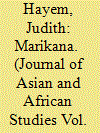

|
|
|
|
|
| Summary/Abstract |
This article analyses some of the reasons for the violent repression of the miners’ strike in Marikana, South Africa, in which 34 people died on 16 August 2012. It explores the economic and productive context which led the Rock Drill Operators to demand a wage increase outside the usual wage-bargaining structures. It goes on to examine the strikers’ subjectivity and the principles of their strike. Because the strike was organised independently of the main union, the National Union of Mineworkers, by miners demanding direct talks with their employer, as a sign of recognition, it illustrated a crisis of representation and embodied an alternative politics. The author argues that the African National Congress government was faced with a challenge to its instituted forms of political representation and, as a result, ordered the police to fire on the demonstrators.
|
|
|
|
|
|
|
|
|
|
|
|
|
|
|
|
| 5 |
ID:
108799
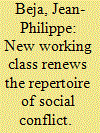

|
|
|
| 6 |
ID:
117770
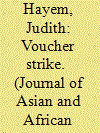

|
|
|
|
|
| Publication |
2012.
|
| Summary/Abstract |
The article presents an anthropological case study of workers' forms of thinking and subjectivity as they appeared at Autofirst, during a strike which took place in December 1998, in South Africa. After conceptualizing my approach as a 'post-classist' analysis following the work of the French political anthropologist Sylvain Lazarus and presenting my methodology, I focus on the problematic word 'happy' and its meaning in the specific subjective sequence. I show how the interviewees' prescriptions that 'a happy worker is a quality worker' and that 'the worker should be happy' as much as management, are indications of the workers' own logic and vision on what is possible in the factory in terms of relationships between management and workforce, during the early post-apartheid period. I contend that a 'classist' vision of capital and labour would not allow us to comprehend the issues at stake in the strike and in South African industry as a whole at that particular moment in time. Finally, I demonstrate the sequential existence of the factory as a place of engagement and of communication between 1995 and 1998, in contrast to the 'apartheid of speech' which, from the workers' point of view, had previously characterized it.
|
|
|
|
|
|
|
|
|
|
|
|
|
|
|
|
|
|
|
|
|